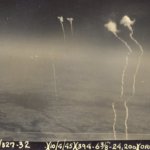TARGET: ORDINANCE DEPOT
ORANIENBURG, GERMANY
10 APRIL, 1945

An Ordinance Depot at Oranienburg, near Berlin, was the primary target. The Group comprised the 94th A Combat Wing with Lt. Col. Francis as Air Commander, and Captain Melvin Fox as pilot. Capt. Monroe J. Hotaling, the Group Gunnery Officer, was flying with Col. Francis. Course over England was flown approximately as briefed. The Group joined Division formation without incident and flew the assembly line in trail of the Division column.
Course to the IP was flown approximately as briefed. Slight deviations to the left and right of course were necessary in order to remain in the Division bomber stream. As the Group neared the IP, a visual bombing was planned.
The Group swung about five miles north of the briefed IP in order to permit squadrons to get interval for the visual run. Bombing was done by squadrons in trail on the target. Cloud coverage at the target was nil. Bombs were dropped from 25,000 feet. Bombing results were observed to be generally good for all squadrons.
Just after bombs away and the turn off the target, three or four Me-262s attacked the Group from the tail. No flak had been encountered. The lead ship piloted by Captain Fox was hit between No. 1 and No. 2 engines. A glowing fire was visible through a four or five foot slit in the wing. The aircraft left the formation and remained under control for several miles flying in an eastward direction. It began to circle to the left, back towards the formation and had completed about a half circle when it went into a spin and exploded.
For the second time, Col. Francis and Captain Hotaling went down as a result of enemy action. Both survived. Only the radio operator, Sgt. Lloyd J. Blood, failed to survive.
The craft piloted by Lt. Thomas P. Thompson was flying the No. 2 position in the high box. Lt. Thompson was flying as pilot for a crew whose regular pilot was not available to fly that day. When Lt. Thompson’s plane was hit, it immediately nosed over and plunged straight down. After it had fallen some distance, it burst into flames, one wing came off and the remainder of the ship exploded at 15,000 feet. Four of the crewmen did not survive the crash.
The craft piloted by Lt. Norman L. Stevens, flying deputy lead, was hit in the No. 3 engine by a Me-262 just after bombs away. There was a severe explosion. The craft dropped out of formation, but managed to stay within range of the bomber stream all the way to the Channel, and made an emergency landing at Woodbridge.
The Eighth Air Force received a message from the British Chiefs of Staff, expressing appreciation for the outstanding achievements against German oil targets during the past ten months General James H. Doolittle ordered the message conveyed to all concerned. General Howard M. Turner of the 1St Air Division noted that outstanding efforts over such along Period were receiving just recognition
